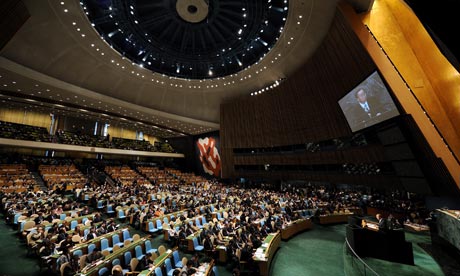In a recent column in the Poverty Matters Blog from the UK Guardian, Alicia Yamin brought up the need to begin planning for the successor agreement. A few excerpts from her commentary are below - full article linked here.
"The latest UN progress report is linked here.
Whatever replaces the MDGs must respond to critics of the original goals. This means targets must be tailored to the needs of individual countries and more people must be involved in the process...
Whatever replaces the MDGs must respond to critics of the original goals. This means targets must be tailored to the needs of individual countries and more people must be involved in the process...
As the 2015 deadline for the millennium development goals (MDGs) draws near, there is an urgent need for inclusive global consultations to draw up a successor agreement. In September, the UN general assembly will meet to discuss how the pace can be accelerated, and what should replace the current framework after 2015...
The successor goals and targets must consider lessons from the current set of MDGs, which are extremely narrow. They focus on sub-sections of certain social sectors and selective human needs. Greater balance could be achieved by including such challenges as creating decent work, reinforcing social protection, and increasing productivity; addressing climate change and its disparate impacts on the poor; ameliorating risks of global financial and commodity market crises; ensuring fairer trade rules; and, finally, reducing gaping inequalities within and between countries, based on class, gender and ethnicity, among other factors...
The MDGs are global targets; they must be adapted at the national level to reflect each country's specific capacities, constraints and challenges.
One of the principal failures of the MDGs has been a lack of accountability for meeting goals in an equitable, transparent and participatory manner that promotes sustained institutional change. The absence of quantifiable commitments for trade, debt, aid and technology transfer has made it particularly difficult to hold the international community to account...
As a survey of more than 100 southern civil society groups recently affirmed, "the process of deciding what comes after the MDGs will be as important as the framework itself" ...
The UN secretary general has acknowledged the need to set a more ambitious development agenda beyond the current MDGs. An urgent and critical first step is to start a process of broad consultations on the post-2015 goals...
Such consultations will require time, involving local, national, and regional debate. They must involve key stakeholder groups, including national governments, national and international civil society organisations and networks, the private sector, and bilateral and multilateral development agencies. Time is short for this process if it is to be meaningful."
Such consultations will require time, involving local, national, and regional debate. They must involve key stakeholder groups, including national governments, national and international civil society organisations and networks, the private sector, and bilateral and multilateral development agencies. Time is short for this process if it is to be meaningful."

No comments:
Post a Comment